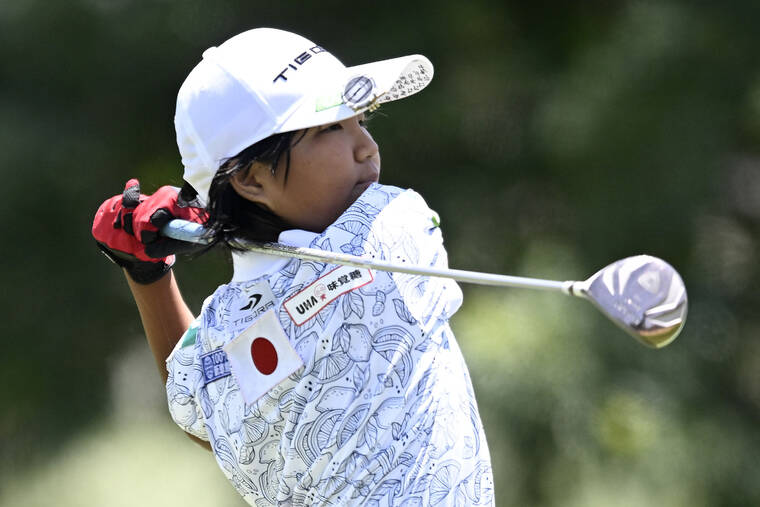EL CAJON, Calif. — Miroku Suto of Japan looks like a professional golfer with logos of 11 sponsors splashed across her polo shirt, cap, bag and even her belt. Her parents say the deals are worth in the mid-six figures annually, with some contracts for 10 years. A 12th sponsorship is waiting when she returns to her home three hours outside of Tokyo.
The sponsors are so important that Suto’s mother and caddie, former figure skater Miyuki Suto, had her daughter change into a sponsor’s belt before she sat for a video interview and carefully arranged her hat in her hands so the logos could be seen.
Miroku Suto has extreme confidence, saying through an interpreter she wants to become “a legend.”
She has a ways to go.
She’s only 10.
Although Suto won consecutive titles in the 6-and-under age group at the Junior World Golf Championships in 2017-18 on a par-3 course, she hasn’t done as well as she’s moved up in age.
She struggled this year in the 9-10 age group and tied for 17th, 18 shots behind the winner on a par-74, 4,201-yard layout at Sycuan Resort Willow Glen Course. It’s the third straight time she has left San Diego without a title (the 2020 tournament was canceled because of the pandemic).
While other girls and boys in the 9-10 age group goofed around on the putting green waiting for the awards ceremony, Suto did interviews on the fringe of a nearby green, including one with a Tokyo TV crew that had followed her around for three days on a suburban course. She did show some playfulness when she briefly laid on her back and did the equivalent of a snow angel on the shaded grass.
Otherwise, it’s all business. She and her mother were dressed alike, including wearing coral-colored seersucker shorts.
Suto is well-known in Japan, a golf-crazed country that has produced two major champions in recent year — Hinako Shibuno in the 2019 Women’s British Open and Hideki Matsuyama at the 2021 Masters. It is not uncommon for TV ratings in Japan to be higher for women than men.
Even at her age, Suto’s golfing exploits are routinely featured on TV, but not so much in the rest in the world — at least not yet.
She is not the first child star. Michelle Wie was 10 when she shot 64 on her home course in Honolulu and became the youngest player to qualify for the U.S. Women’s Amateur Public Links. At age 13, she won that tournament and remains the USGA’s youngest champion. She nearly won an LPGA major at 16 and eventually won a U.S. Women’s Open in 2014.
That same year, 11-year-old Lucy Li became the youngest player to qualify for the U.S. Women’s Open. The sixth-grader missed the cut at Pinehurst No. 2. Earlier this month, now a pro, Li won her second Epson Tour event and is all but assured an LPGA card for next year.
For sponsorships, Suto came along at the right time.
Li ran into trouble with the USGA three years ago when she appeared in an Apple ad. The rules back then prohibited amateur golfers from using their names or likeness for personal gain in promotions or advertisements for products. The USGA gave her a one-time warning.
But the USGA and R&A — Japan falls under the jurisdiction of the latter — have modernized rules. Starting this year, the rules for amateur status eliminated all advertising, expense-related and sponsorship restrictions. The rule change was aimed at elite amateurs who might need funding to reach their full potential.
The kid still has a long way to go to fulfill that.
Golf’s most famous prodigy was a young Californian named Tiger Woods. He won his age division in the Junior World, a tournament that has attracted the best from around the world since 1968, six times in eight years.

